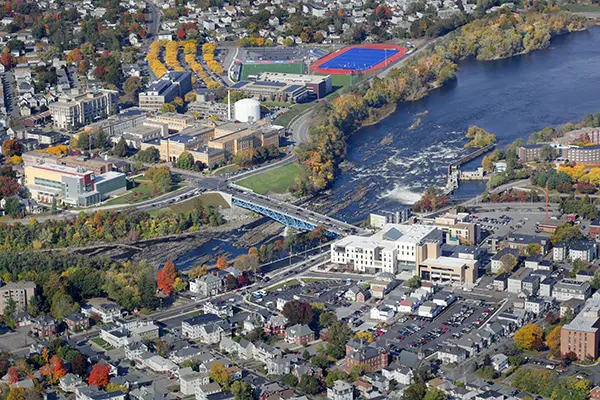
University of Massachusetts Lowell (UMass Lowell) faculty are pooling their expertise to train young engineers, scientists and policymakers how to protect threatened water resources.
Led by Plastics Engineering Associate Prof. Meg Sobkowicz-Kline and Mechanical Engineering Associate Prof. Chris Hansen, the team has received nearly $3 million from the National Science Foundation to create the Sustainable Water Innovations in Materials – Mentoring, Education and Research (SWIMMER) program at UMass Lowell. The initiative is one of 23 projects to receive a share of $64 million in funding from the National Science Foundation Research Traineeship program as part of the American Rescue Plan Act of 2021.
The program will train 60 UMass Lowell master’s and Ph.D. students to develop sustainable materials and chemicals that will reduce harm to water resources. Participants will be students pursing degrees in plastics, mechanical, chemical, and civil and environmental engineering; as well as chemistry; earth science; biology; public health; economics; and other disciplines.
UMass Lowell faculty members leading the project are developing its curriculum and hope to launch SWIMMER with a dozen students next fall. Participants will pursue their advanced degrees in their chosen fields, while also working across disciplines with other members of the team.
The program will feature a preparatory boot camp, a two-semester core course and team capstone projects. Participants will also complete an internship hosted by partner organizations, such as the Merrimack River Watershed Council, or with a company affiliated with the Green Chemistry and Commerce Council, where UMass Lowell Public Health Prof. Joel Tickner is executive director.
At the Tsongas Industrial History Center, SWIMMER scholars will learn how past pollution in the Merrimack River led to health crises in Lowell. The Merrimack now provides drinking water for about 500,000 people in five Massachusetts communities, including Lowell, and to several communities in New Hampshire.
“They will see what the health of the river was in the past, what it is in the present and how to hopefully prevent pollution in the future,” Hansen said. “We don’t want all of the students’ education to happen just at UMass Lowell or just with their research faculty. The idea is to have real-world engagement.”
Participants will also address issues such as toxic “forever chemicals,” including polyfluoroalkyl substances (PFAS) in water supplies and how droughts, both in the U.S. and across the world, affect water resources.
“This is a relevant topic that applies to their life,” he said. “They can be a change agent, an agent for good in the world.”
Along with Sobkowicz-Kline, Hansen and Tickner, other UMass Lowell faculty members who will help train participants include Civil and Environmental Engineering Associate Prof. Sheree Pagsuyoin, Chemistry Assistant Prof. James Reuther, Environmental Earth and Atmospheric Sciences Prof. Juliette Rooney-Varga, Biological Sciences Assistant Prof. Frederic Chain, Economics Associate Prof. David Kingsley, and Greg Morose, research manager at UMass Lowell’s Toxics Use Reduction Institute.
“There are a lot of diverse research topics within the field of water and materials interactions that students can take a lot of different ways,” Sobkowicz-Kline said. “We’re grateful to have faculty here at UMass Lowell who can make this go forward successfully.”
To ensure the program includes the talents of a diverse group of students, the initiative will also recruit graduate students from Prairie View A&M University and the University of Puerto Rico Mayaguez. Both universities are deemed minority-serving institutions by the U.S. Department of Education.
Hansen and Sobkowicz-Kline said it’s critical to produce graduates with not only the STEM skills required for innovative solutions, but who are also responsive to societal needs for environmental justice and inclusive decision-making.
“It’s just a fact that minority communities in America are disproportionately impacted by pollution and by degradation of resources,” Hansen said.
Hansen hopes the SWIMMER program can serve as a springboard for participating students’ careers, be it in industry, at a startup, at a nonprofit, in public service or in the classroom as an educator.
“We want them to form lifelong partnerships and collaborations with the other people in their cohort, and we want them to translate that into amazing research that becomes nationally and internationally known,” he said. “And then ultimately, when they graduate, they’re doing something that really no one else has this skillset to do.”
SWIMMER was one of 23 projects to receive a share of $64 million in funding from the NSF Research Traineeship program as part of the American Rescue Plan Act of 2021.
